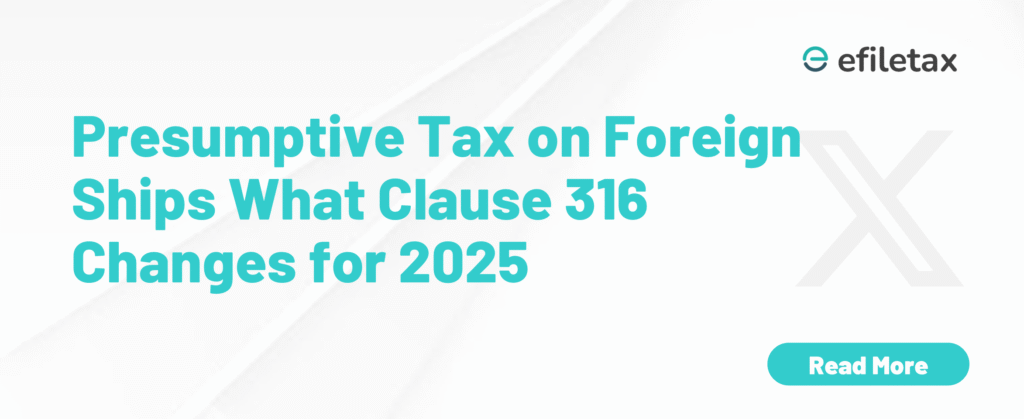
Presumptive Taxation of Foreign Shipping Companies is crucial for global shipping operators earning from Indian ports. Clause 316 of the new Income Tax Bill 2025 proposes fresh rules to replace Section 172 of the Income-tax Act, 1961. Let’s decode what changes, what stays, and what foreign ship owners must know.
What is Presumptive Taxation of Foreign Shipping Companies?
- It’s a special method to tax income of non-resident shipping companies for voyages touching Indian ports.
- Designed for quick tax collection and compliance ease.
Clause 316: What’s New in Income Tax Bill 2025
Here’s how Clause 316 updates the old regime under Section 172:
| Particulars | Section 172 (Old) | Clause 316 (New) |
|---|---|---|
| Applicable To | Non-resident ship owners/charterers | Same scope retained |
| Presumptive Basis | 7.5% of total freight deemed income | Same percentage continues |
| When Taxed | Each voyage taxable separately | Voyage-wise system continues |
| Advance Payment | Tax collected before port clearance | Process streamlined under updated bill |
| Appeal | Limited scope for appeal | Provisions aligned with new appeal framework |
Why the Change?
- To modernise language & remove ambiguities.
- To align with international tax standards.
- To unify old provisions with the revamped Income Tax Bill 2025 structure.
Key Highlights of Clause 316
✅ Applies to all foreign shipping operators earning freight from Indian ports.
✅ Tax is 7.5% of gross freight — no need to maintain detailed profit records for each trip.
✅ Failure to comply may lead to seizure or detention of the ship.
Expert Tip for Foreign Ship Operators
Always engage an authorised Indian shipping agent to handle tax filing, advance payment, and voyage clearances smoothly. Non-compliance can disrupt your shipping schedules and increase costs.
Legal References
FAQ: Presumptive Taxation of Foreign Shipping Companies
Q1. Is the 7.5% rate changed in Clause 316?
No, it remains the same as under Section 172.
Q2. Do shipping companies have to file an ITR?
Generally, payment before clearance covers compliance, but an annual return may be needed if additional Indian income exists.
Q3. What happens if tax is not paid before clearance?
Port authorities can detain the ship until dues are settled.
Conclusion
Clause 316 simplifies and updates the Presumptive Taxation of Foreign Shipping Companies, ensuring ease for foreign operators and swift revenue collection for India. For smooth compliance, consult Efiletax’s team of tax experts for assistance with shipping tax clearances and documentation.
👉 Need help with foreign shipping taxation? Contact Efiletax today!
Summary:
Clause 316 of Income Tax Bill 2025 updates presumptive taxation for foreign shipping companies, retaining the 7.5% freight rule of Section 172 and streamlining compliance for voyages touching Indian ports.